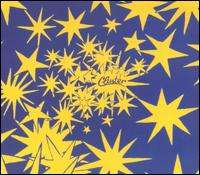Cluster II (album)
Cluster II is the second full-length album by German electronic music act Cluster, released in 1972 by record label Brain.
| Cluster II | ||||
|---|---|---|---|---|
 | ||||
| Studio album by | ||||
| Released | 1972 | |||
| Recorded | January 1972 | |||
| Studio | Star-Studio, Hamburg, Germany | |||
| Genre | ||||
| Length | 45:09 | |||
| Label | Brain | |||
| Producer | Cluster & Conrad Plank | |||
| Cluster chronology | ||||
| ||||
Production
It is their first album with the band reduced to a duo; Conny Plank, who was credited as a member on the first album, decided to concentrate on production and engineering. Plank is still credited as a composer together with Hans-Joachim Roedelius and Dieter Moebius on all tracks.
Cluster II was recorded at Star-Studio in Hamburg, Germany in January 1972.
It was Cluster's first release for legendary krautrock label Brain,[2] a relationship which would last until 1975 and include the subsequent album Zuckerzeit as well as the first two Harmonia albums, a group which included both remaining members of Cluster and Michael Rother of Neu!.
Content
Cluster II continued the transition away from the discordant, proto-industrial sound of Kluster towards a more electronic sound.[2] It was the first album to feature relatively short tracks and it was the first album in which tracks were named. (Earlier Kluster albums as well as the eponymous first Cluster album had unnamed pieces.)
Release
The album was first reissued on CD in 1994 on the Spalax label with subsequent reissues on Universal in 2004, Revisited in 2007 and Esoteric in 2012.
Reception
| Review scores | |
|---|---|
| Source | Rating |
| AllMusic | |
| Pitchfork | 7.7/10[3] |
Julian Cope included Cluster II in his "Krautrock Top 50" list.[4]
Track listing
All tracks written by Hans-Joachim Roedelius, Dieter Moebius and Conrad Plank.
- Side A
- "Plas" – 6:00
- "Im Süden" – 12:50
- "Für die Katz" – 3:00
- Side B
- "Live in der Fabrik" – 14:50
- "Georgel" – 5:25
- "Nabitte" – 2:40
Personnel
- Hans-Joachim Roedelius – electronics
- Dieter Moebius – electric organ, guitars, effects & electronics
- Conrad Plank – producer
Notes
- Cluster II at AllMusic
- Dome, Malcolm (2012). Cluster II (CD booklet). Cluster. London: Esoteric Recordings.
- Beta, Andy (7 May 2016). "Cluster / Brian Eno / Dieter Moebius / Roedelius: Cluster: 1971–1981 Album Review | Pitchfork". Pitchfork. Retrieved 24 August 2016.
- "A Krautrock Top 50 – Julian Cope". midsuffolk.unisonplus.net. Archived from the original on 6 October 2003. Retrieved 24 August 2016.
External links
- Cluster II at Discogs (list of releases)
- Prog Archives article on the album
- A Curious History of Cluster